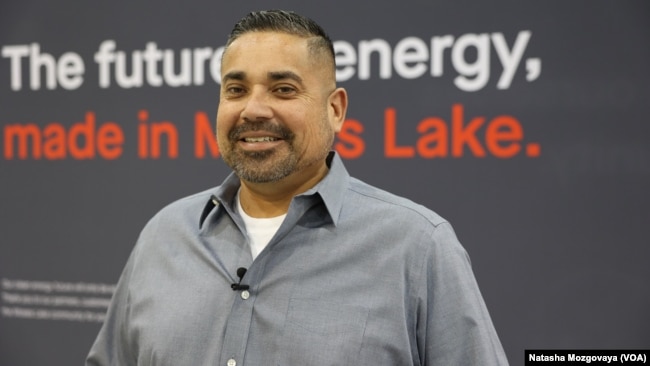MOSES LAKE, WASHINGTON — It’s mid-winter in east Washington state, yet despite the chilly fog, two construction sites in the town of Moses Lake are brimming with activity. Several hundred workers are on an ambitious timeline to complete two new factories slanted to begin production of the next-generation components for electric vehicle batteries later this year.
Two American start-ups, backed by $100 million in federal grants each, in addition to commercial partnerships, are racing to secure the domestic supply chain with the next-generation battery materials for EV automakers.
“That’s going to go into everything from electric vehicles to IoT [Internet of Things] devices to smartphones and wearables and a lot of battery-based applications that we don’t even know exist yet,” explains Nik Anderson, director of program management with Group 14 Technologies, as he walks through the company’s vast construction site.
Washington is one of the American states planning to ban sales of new gasoline-powered vehicles starting in 2035.
For now, electric cars account for 8.6% of new vehicle sales in the United States. Affordable electric vehicles would require a significant scaling of domestic battery production, experts say. According to the Biden administration, affordable electric vehicles and reliable supply chain would require a significant scaling of domestic battery production and the national charging infrastructure.
Once fully operational, the two companies’ factories in Moses Lake will be able to annually produce enough material to make batteries for about 400,000 electric vehicles.

They also promise to produce a better battery, reducing the ‘charge anxiety’ of electric cars by replacing the graphite in conventional lithium-ion batteries with silicon-based components, which will allow for a faster charge.
“The thing that makes our battery better, that uses our SCC55 [silicon-carbon composite] versus traditional graphite, is that it can have up to 50% more energy density, it can allow for extremely fast charging,” said Grant Ray, vice president for global market strategy with Group 14.
“When we think about charge times, you know, right now we’re hearing 10% to 80% in ten minutes. Well, what if that changes and it comes down to five minutes? What if it starts to get closer to what it really is for, you know, the way we think about refueling a car?” he said.
One of the challenges for U.S. EV production with traditional lithium-ion batteries is the need to rely on imports. Daniel Schwartz, director of the Clean Energy Institute at the University of Washington, says the silicon-based component provides solutions for several challenges.
“The primary mineral for what’s going in Moses Lake is sand, silica — the most widely distributed mineral in the crust of the earth. Graphite is lower performance, and we are trade-exposed as a nation,” he said.
The Biden administration invested in domestic EV battery production as part of its ambitious clean energy agenda. Among the Republican presidential candidates, most reject the urgency surrounding EV adoption, with former President Donald Trump calling it an “all-electric car hoax.”
Last September, speaking in front of hundreds of people attending a rally in Clinton Township, Michigan, Trump called prioritizing EVs a “transition to hell,” telling auto workers that Democrats “want to go all electric and put you all out of business.”
Gene Berdichevsky, CEO of Sila Nanotechnologies, the second startup planning to start EV battery components production in Moses Lake, says the transition to electric vehicles is going to happen regardless of whether the U.S. is taking the lead in the process.
“Renewables and batteries are really going to form the basis of 21st-century energy,” he said. “It’s critical for the U.S. to build the capacity to be able to have battery production. Catching up to the world leaders in Asia is quite challenging. And so, the way to do that is not to build the same thing, it’s to build the next generation of battery technologies.”
In Moses Lake, a town of about 25,000 an hour and-a-half drive from the nearest city, all-electric cars are not a common sight. Berdichevsky is convinced that EV adoption in the area is just a matter of time.
“We have to recognize that consumers want choice, and some consumers are going to want electric cars with 500 miles (range),” he says. “What we need to do is increase the choices for folks, and the way you do that is through better batteries.”
Rosendo Alvarado, a Moses Lake native who took a job as a plant manager for Sila Nanotechnologies, says the remote town became an attractive spot for EV production thanks to the combination of several factors: cheap hydro power provided by local dams; existing manufacturing infrastructure and legacy companies, such as REC Silicon that could become a partner in the EV batteries production; and Washington state policies embracing clean energy initiatives.

The cutting-edge industry promises to bring hundreds of new jobs to Moses Lake. Alvarado says he saw the town transforming over time from traditional farming to an industrial community — and expects further change.
“We worked in the fields that this building is sitting on today,” he recalls. “It’s been fast paced, but super exciting — the opportunities that we are able to bring here for the community and for the EV market.”
He says the companies partnered with the local Columbia Basin Technical School and Big Bend Community College to start developing a new workforce as early as during high school classes.
“It’s a small, tight community. Kind of like everyone knows everyone type thing,” shrugs Nicholas Cruz, a young man out of school walking with his friend down the main street of Moses Lake, when asked about the EV projects coming to town.
“It’s gonna be exciting in the sense, like, there’s more job opportunities and new opportunities to go here because Moses Lake is small, there’s not much to it. I am not sure if it will impact me personally — I guess time will tell,” he said.
Source: VOA


